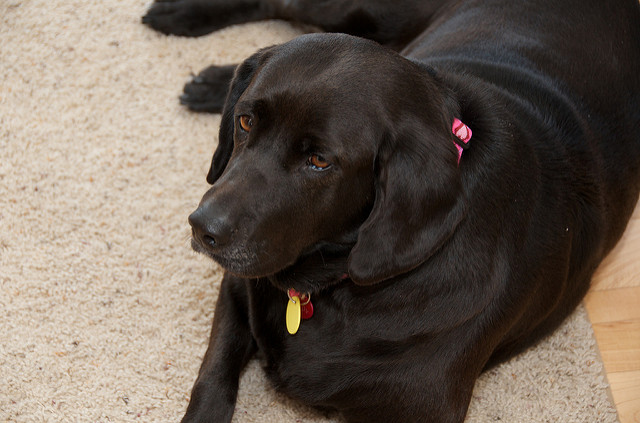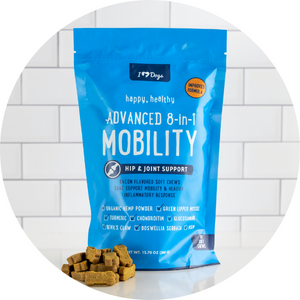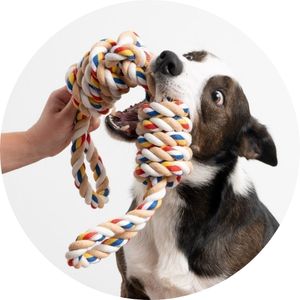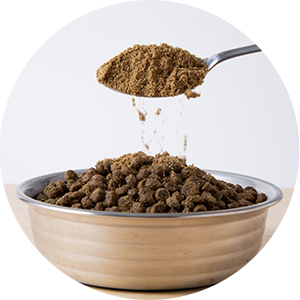Labrador Retrievers are true food hounds and as they age, many of them become a bit lazy. This combination often results in an overweight Lab. Labs seem to be skilled at gaining weight and owners should be aware that all those extra pounds come with a lot of health issues that can even shorten their lifespan. Because of this, Labrador Retriever owners should pay attention to the following 3 signs that their Lab is overweight. If you believe he is getting a bit pudgy ‘round the middle, you should talk to your vet to rule out any medical causes and get him on a diet and exercise program.
How Much Should Lab Weigh?
55 to 79 Lbs

#1 – Can’t Feel Ribs
You should be able to feel your Labrador Retrievers ribs easily when you run your hand over their middle. Labs are not a breed where the ribs are generally visible, but you should definitely be able to feel them.
#2 – No Definition
While not as obvious as some breeds, healthy Labrador Retrievers should have some definition to their body. This means that they have a deep chest and a bigger rib cage that tapers off to their waists by their hip bones. If your dog is one smooth line from chest to tail, she is packing extra pounds. Dr. Sophia Yin’s website has a great, easy to follow guide for checking your Lab’s body health.
#3 – Panting
Unless your Labrador Retriever is stressed or too warm, panting is another sign he is overweight. If your Lab starts to pant after only walking a block, he may be out of shape and overweight. Definitely time to start an exercise regimen to slowly build back his stamina and lose some pounds.
Frequently Ask Questions
If you are worried that your Labrador might be overweight, read on! Understand your dog better by knowing how much they should weigh, what to feed them, and the signs indicating your pup has a weight problem. Dogs are quite prone to obesity, especially with labs, as they love to eat. Learn how to take care of your dog for their best life possible.
Is My Lab Fat?
Labradors do love to eat, and they are not necessarily muscular dogs with lean bodies, but they should have some definition in their form. If you cannot distinguish your dog’s hips or rib cage, chances are strong; she’s carrying more weight than necessary. Check to see if his stomach tucks in toward his groin, hangs flat from his front legs to his back, or worse, sags down between his knees.
Next, your dog should be able to scratch his own itches, even behind the ears, unless he’s overweight. He should not have difficulty chewing on his own nails or licking any part of his body. Obese dogs have far more range limits than dogs with a healthy weight.
Finally, a fat dog gets tired more easily. Obese dogs have a tendency to wheeze and move slowly, which are both evident signs that they are exhausted as a result of their condition. This suggests that he is out of shape and probably overweight, barring the possibility that the weather is extremely hot.
Lab Weight Chart By Age
| Age | Weight |
| 1 month | 2 – 6 lb |
| 2 months | 5 – 15 lb |
| 3 months | 20 – 30 lb |
| 4 months | 25 – 40 lb |
| 5 months | 30 – 45 lb |
| 6 months | 35 – 55 lb |
| 7 months | 40 – 60 lb |
| 8 months | 40 – 65 lb |
| 9 months | 45 – 70 lb |
| 10 months | 50 – 70 lb |
| 11 months | 55 – 75 lb |
| 12 months | 55 – 80 lb |
| 2 years | 55 – 80 lb |
How Much Does The Average Lab Weigh?
Seeing and touching your Labrador are the greatest ways to determine if he or she is overweight. Giving a definitive number may be entirely inaccurate based on your dog’s genetics. Your lab’s optimal weight will vary greatly based on several factors, including whether he or she is field or bench bred, how tall he or she is, how stocky or thin he or she is, and whether he or she is male or female.
Adult Labradors typically weigh between 55 and 80 pounds. A male Labrador retriever will typically weigh 5 to 10 pounds more than a female. After performing the aforementioned self-checks, if you are still concerned about whether or not your lab is at a healthy weight for his or her frame, it is recommended to see your local veterinarian. They will gladly tell you the ideal weight for your specific Labrador.
What Is The Ideal Healthy Weight For A Lab?
Common Labrador weight is between 55 to 85 pounds. Remember that certain labs with smaller or larger bone structures may fall outside the range but still be at their ideal weight and fitness level if you use this as a guide.
How Big Does A Lab Get?
A strong and well-balanced Labrador Retriever can range in height from 21.5 to 24.5 inches at the shoulder and in weight from 55 to 80 pounds, depending on the sex.
How Can I Help My Overweight Lab?
As many factors can help contribute to obesity, many factors will help you to reduce your dog’s weight. Think in terms of lifestyle changes instead of calorie restrictions, just like you would for yourself. That being said, overfeeding, especially of human food, contributes significantly to this problem.
Before making any alterations to your lab’s diet or exercise routine, it is important to get them checked by the vet to make sure there are not any underlying medical conditions, such as hypothyroidism or diabetes. Next, watch how much food and treats your dog is getting each day.
More costly kibble is often higher in protein and fat content and lower in filler carbs. Prior to domestication, dogs did not consume carbs, and their digestive systems were not adapted to process them. Wet food is better than kibble since it has more protein and water and fewer carbs.
Increasing your lab’s activity level will help him lose weight more quickly. Labs are happy, active dogs ready to play and walk for hours. Try to find time to incorporate more exercise into his or her daily life to reduce the number of calories your dog keeps.
How Much Should A Lab Eat A Day?
The recommended daily amount of dog food for a Labrador Retriever is between one and six cups. Moreover, the amount of food you feed your lab should be based on several aspects, including its age, degree of activity, and the sort of food it eats. About three to six cups of dog chow per day are about average for an adult Labrador.
These portions are based on dry kibble and will vary depending on the type of food you feed your pet. If your lab does not eat kibble, read on to learn how much and when to feed him. It is more important to feed your Labrador the right amount of food for his size and activity level than it is to strictly adhere to the recommendations on food labels or in books.
Are Labs Prone To Obesity?
A Labrador’s appetite is legendary. They have a reputation for being a bit chubby or even overweight due to their healthy appetites and their ability to manipulate humans into feeding them. Still, Labs appear to have a genetic predisposition toward a voracious appetite.
The Labrador Retriever is a sporting dog bred for long periods of physical activity such as running, swimming, hunting, and retrieving. You may worry about your Labrador’s ability to run, jump, and retrieve if he is overweight. They need to be in good physical condition and free of excess fat to play and work well.
How Do I Know If My Lab Is Too Fat?
Knowing that you have a problem on your hands is the first step in dealing with a dog that is overweight or obese. Checking the coverage of your dog’s ribs is a simple and effective way to determine if your dog is overweight that you can do yourself at home. You should feel your dog’s ribs immediately behind the shoulder blades like you can feel your own knuckles when your palm is down, and the flats of your fingers meet them.
It is a great way to track your progress toward your weight loss goals in between doctor’s visits. Your veterinarian’s office can help you to determine if your lab is too fat. They can also give you a ballpark figure for what your pet should weigh as a goal. However, it is also important to get regular body condition scores to ensure your pet is progressing toward a healthy weight and condition.
What is the average weight for a black lab?
Both male and female labradors can weigh anywhere from 55 to 75 pounds. Many otherwise healthy Labradors, however, do not fit these norms. The average weight depends on many factors, but as a general rule, it’s more important your dog is healthy and not a specific weight.
How Much Does An English lab weigh?
The average weight of a female English Lab is around 60 to 70 pounds, and a male can be anywhere from 70 to 80 pounds. It is not uncommon for some chunkier, show-bred Labs to be twenty or more pounds heavier than their field-bred cousins.
How Much Should a female lab weigh?
Labrador females can range in weight from 55 to 75 pounds as adults. However, the lighter the weight, the healthier. Although, if your female lab weighs a little extra, you may need to take her to the vet and check for pregnancy.
Overweight Breed Informational Pages
- Is My Bulldog Overweight Or Obese?
- Is My Chihuahua Overweight Or Obese?
- Is My Corgi Overweight Or Obese?
- Is My Dachshund Overweight Or Obese?
- Is My Doberman Overweight Or Obese?
- Is My German Shepherd Overweight Or Obese?
- Is My King Charles Spaniel Overweight Or Obese?
- Is My Lab Overweight Or Obese?
- Is My Maltese Overweight Or Obese?
- Is My Pit Bull Overweight Or Obese?
- Is My Pomeranian Overweight Or Obese?
- Is My Rottweiler Overweight Or Obese?
- Is My Shih Tzu Overweight Or Obese?
- Best Joint Supplement for Dogs
- Best CBD Gummies for Dogs
- Goat's Milk for Dogs
- Skin & Coat Supplements for Dogs
- Weight Gain Supplements for Dogs
- Muscle Building Supplements for Dogs
- Heart Supplements for Dogs
- Multivitamins for Dogs
- Pill Pockets for Dogs
- Digestive Enzymes for Dogs
- Turmeric for Dogs
- Liver Supplements for Dogs
- Tear Stain Supplement for Dogs
- Breath Fresheners for Dogs
- Kidney, Urinary, & Bladder Supplements for Dogs
- Stool Eating Deterrent for Dogs
- Eye Supplements for Dogs
- Melatonin for Dogs
- Apple Cider Vinegar for Dogs
- Green Lipped Mussels for Dogs
- L Theanine for Dogs
- Chondroitin Supplements for Dogs
- MSM for Dogs
- Valerian Root for Dogs
- Chamomile for Dogs
- Boswellia for Dogs
- L Tryptophan for Dogs
- Yucca for Dogs
- Licorice Root for Dogs
- Bromelain for Dogs
- Papain for Dogs
- Devil's Claw for Dogs
- Quercetin for Dogs
- Hemp gummy for dogs
- Best Hemp Dog Treats
- Best Hemp Oil for Dogs
- Best Calming Treats, Chews, & Supplements for Dogs
- Best Bone Broth for Dogs
- Best Fish Oil for Dogs
- Best Probiotics for Dogs
- Best Hip Dysplasia Supplements for Dogs
- Best Colostrum for Dogs
- Best Quercetin for Dogs
- Best Greens for Dogs Supplements
- Best Vitamin C Supplements for Dogs
- Best Probiotic for Dog with Allergies
- Best Taurine Supplements for Dogs
- Best Dog Food Toppers
- Best Anal Gland Supplement for Dogs
- Best Dog Probiotic Powder
- Best CoQ10 Supplement for Dogs
- Best Liquid Glucosamine for Dogs
- Best Wrinkle Creams, Balms, and Wipes for Dogs
- Best Puppy Calming Treats
- Best Colloidal Silver for Dogs
- Best Adaptogen Supplements for Dogs
- Best Cognitive Supplements for Dogs
- Best Bee Pollen for Dogs
- Best Vitamin A Supplements for Dogs
- Best Vitamin E Supplements for
- Best Liquid Glucosamine Supplements for Dogs
- Best SAM-e Supplements for Dogs
- Best Hyaluronic Acid Supplements for Dogs
- Best Apple Cider Vinegar Supplements for Dogs
- Best Diarrhea Medicine for Dogs
- Best Milk Thistle for Dogs
- Best Turkey Tail Mushroom Supplements for Dogs
- Best Astaxanthin Supplements for Dogs
- Best Lutein Supplements for Dogs
- Best Electrolyte Supplements for Dogs
- Best Coconut Oil for Dogs
- Best Prenatal Vitamins for Dogs
- Best Puppy Milk Replacements
- Best Iron Supplements for Dogs
- Best Dewormer Products for Dogs
- Best Mange Medications for Dogs
- Best Cough Relief Products for Dogs
- Best Sinus Relief Products for Dogs
- Best Collapsed Trachea Supplements for Dogs
- Best Fireworks Anxiety Relief Products for Dogs
- Best Thunderstorm Anxiety Relief Products for Dogs
- Best Travel Anxiety Relief Product for Dogs
- Best Supplements for a Dog with a Torn ACL
- Best Supplements for a Dog with Patellar Luxation
- Best Supplements for a Dog with Intervertebral Disc Disease
- Best Zinc Supplements for Dogs
- Best Biotin Supplements for Dogs
- Best Tart Cherry Supplements for Dogs
- Best Resveratrol Supplements for Dogs
- Best Ginkgo Biloba Supplements for Dogs
- Best Ashwagandha Supplements for Dogs
- Best Supplements for Dogs with Cushing's Disease
- Best Adrenal Supplements for Dogs
- Best NAD+ Supplements for Dogs
- Best NMN Supplements for Dogs
- Best Supplements for Dogs with Dementia
- Best Supplements for Dogs with CCD(Canine Cognitive Dysfunction)
- Best Fiber Supplements for Dogs
- Best Spirulina for Dogs
- Best Hairball Remedies for Dogs
- Best Eye Drops for Dogs with Allergies
- Best Magnesium Supplements for Dogs
- Best Brushes for Double-Coated Dogs
- Best Dandelion Root Supplements for Dogs
- Best Probiotic for Dogs with Yeast Infections
- Best Flaxseed Oil for Dogs
- Best Chamomile Supplements for Dogs
- Best Lavender Supplements. Treats & Sprays for Dogs
- Best Collagen Supplements for Dogs
- Best Kelp Supplements for Dogs
- Best Activated Charcoal for Dogs
- Best Slippery Elm Supplements for Dogs
- Best Supplements for Dogs with Seizures & Epilepsy
- Best Antioxidant Supplements for Dogs
- Best Ubiquinol Supplements for Dogs
- Best Hormone & Glandular Supplements for Dogs
- Best Thyroid Supplements for Dogs
- Best Iodine Supplements for Dogs
- Best Dog Shedding Supplements for Dogs
- Best Detox Supplements for Dogs
- Best Postbiotics for Dogs
- Best Aspirin Products for Dogs
- Best Dog Anti-Nausea Products
- Best Dog Mouthwashes
- Best Camelina Oils for Dogs
- Best Hemp Seed Oils for Dogs
- Best Natural Anti-Inflammatories for Dogs
- Best Cancer Supplements for Dogs
- Best Sardine & Anchovy Oils for Dogs
- Best Fatty Acid Supplements for Dogs
- Best Chia Seed Supplements & Treats for Dogs
- Best Olive Oils for Dogs
- Best Amino Acid Supplements for Dogs
- Best Moringa Supplements for Dogs
- Best Echinacea Supplements for Dogs
- Best Cranberry Supplements for Dogs
- Best D-Mannose Supplements for Dogs
- Best Nettle Leaf Supplements for Dogs
- Best Marshmallow Root Supplements for Dogs
- Best Astragalus Supplements for Dogs
- Best Pumpkin Seed Supplement for Dogs
- Best Supplements for a Dog Wetting The Bed
- Best Blueberry Supplement for Dogs
- Best Bromelain Supplements for Dogs
- Best Yucca Supplements for Dogs
- Best Ginger Supplements for Dogs
- Best Rosehip Supplements for Dogs
- Best Allergy Medicines for Dogs
- Best Reishi Mushroom Supplement for Dogs
- Best Maitake Mushroom Supplement for Dogs
- Best Chaga Mushroom Supplement for Dogs
- Best Shiitake Mushroom Supplement for Dogs
- Best Cordyceps Mushroom Supplement for Dogs
- Best Lion's Maine Supplement for Dogs
- Have question? - Ask in our Dog Health Forum






 Toledo, United States.
Toledo, United States.
